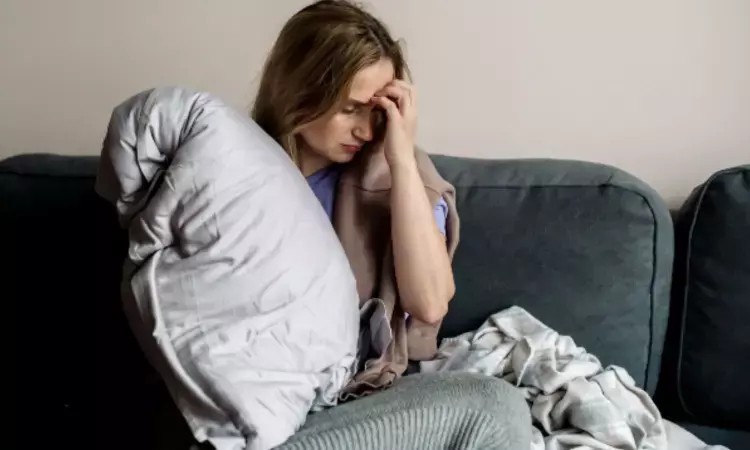- Home
- Medical news & Guidelines
- Anesthesiology
- Cardiology and CTVS
- Critical Care
- Dentistry
- Dermatology
- Diabetes and Endocrinology
- ENT
- Gastroenterology
- Medicine
- Nephrology
- Neurology
- Obstretics-Gynaecology
- Oncology
- Ophthalmology
- Orthopaedics
- Pediatrics-Neonatology
- Psychiatry
- Pulmonology
- Radiology
- Surgery
- Urology
- Laboratory Medicine
- Diet
- Nursing
- Paramedical
- Physiotherapy
- Health news
- Fact Check
- Bone Health Fact Check
- Brain Health Fact Check
- Cancer Related Fact Check
- Child Care Fact Check
- Dental and oral health fact check
- Diabetes and metabolic health fact check
- Diet and Nutrition Fact Check
- Eye and ENT Care Fact Check
- Fitness fact check
- Gut health fact check
- Heart health fact check
- Kidney health fact check
- Medical education fact check
- Men's health fact check
- Respiratory fact check
- Skin and hair care fact check
- Vaccine and Immunization fact check
- Women's health fact check
- AYUSH
- State News
- Andaman and Nicobar Islands
- Andhra Pradesh
- Arunachal Pradesh
- Assam
- Bihar
- Chandigarh
- Chattisgarh
- Dadra and Nagar Haveli
- Daman and Diu
- Delhi
- Goa
- Gujarat
- Haryana
- Himachal Pradesh
- Jammu & Kashmir
- Jharkhand
- Karnataka
- Kerala
- Ladakh
- Lakshadweep
- Madhya Pradesh
- Maharashtra
- Manipur
- Meghalaya
- Mizoram
- Nagaland
- Odisha
- Puducherry
- Punjab
- Rajasthan
- Sikkim
- Tamil Nadu
- Telangana
- Tripura
- Uttar Pradesh
- Uttrakhand
- West Bengal
- Medical Education
- Industry
Perceived cognitive deficits in first 4 weeks of COVID-19 infection associated with post covid condition

A new study by Teresa Liu and team showed that patient reported cognitive impairments during the first four weeks of SARS-CoV-2 infection are linked to post–COVID-19 condition (PCC) symptoms, and some patients' PCC may also have an emotional component. The findings of this study were published in Journal of American Medical Association.
Acute SARS-CoV-2 infection and post-COVID-19 condition (PCC; also known as extended COVID) both frequently cause neuropsychiatric symptoms, however it is uncertain if these symptoms and PCC are related. In order to better understand the characteristics of patients with observed cognitive impairments within the first four weeks of SARS-CoV-2 infection and the relationship between those deficits and PCC symptoms, this study was carried out.
With a follow-up of 60 to 90 days, this prospective cohort research took place from April 2020 to February 2021. The cohort was made up of adults registered in the University of California, Los Angeles, SARS-CoV-2 Ambulatory Programme who had a laboratory-confirmed symptomatic SARS-CoV-2 infection and were either hospitalized in a UC Los Angeles hospital or one of 20 nearby healthcare facilities, or were outpatients referred by a primary care physician. The period of data analysis was from March 2022 to February 2023.
The key findings of this study were:
At 30 days after hospital discharge or outpatient diagnosis, 766 of the 1296 patients who were included in the programme completed the perceived cognitive impairment items.
276 out of the 766 patients felt they had a cognitive disability, with 112 patients having a mean score over 1.5 and 164 having a mean score between 0 and 1.5.
Reports of a reported cognitive disadvantage were linked to prior cognitive problems and a diagnosis of depressive illness.
Those with reported cognitive abnormalities in the first four weeks after contracting SARS-CoV-2 were more likely to experience PCC symptoms than those without such perceptions.
Perceived cognitive impairments during the first four weeks of SARS-CoV-2 infection were linked to PCC symptoms compared to no perceived cognitive deficits after adjusting for demographic and clinical variables.
Reference:
Liu, T. C., Yoo, S. M., Sim, M. S., Motwani, Y., Viswanathan, N., & Wenger, N. S. (2023). Perceived Cognitive Deficits in Patients With Symptomatic SARS-CoV-2 and Their Association With Post–COVID-19 Condition. In JAMA Network Open (Vol. 6, Issue 5, p. e2311974). American Medical Association (AMA). https://doi.org/10.1001/jamanetworkopen.2023.11974
Neuroscience Masters graduate
Jacinthlyn Sylvia, a Neuroscience Master's graduate from Chennai has worked extensively in deciphering the neurobiology of cognition and motor control in aging. She also has spread-out exposure to Neurosurgery from her Bachelor’s. She is currently involved in active Neuro-Oncology research. She is an upcoming neuroscientist with a fiery passion for writing. Her news cover at Medical Dialogues feature recent discoveries and updates from the healthcare and biomedical research fields. She can be reached at editorial@medicaldialogues.in
Dr Kamal Kant Kohli-MBBS, DTCD- a chest specialist with more than 30 years of practice and a flair for writing clinical articles, Dr Kamal Kant Kohli joined Medical Dialogues as a Chief Editor of Medical News. Besides writing articles, as an editor, he proofreads and verifies all the medical content published on Medical Dialogues including those coming from journals, studies,medical conferences,guidelines etc. Email: drkohli@medicaldialogues.in. Contact no. 011-43720751


